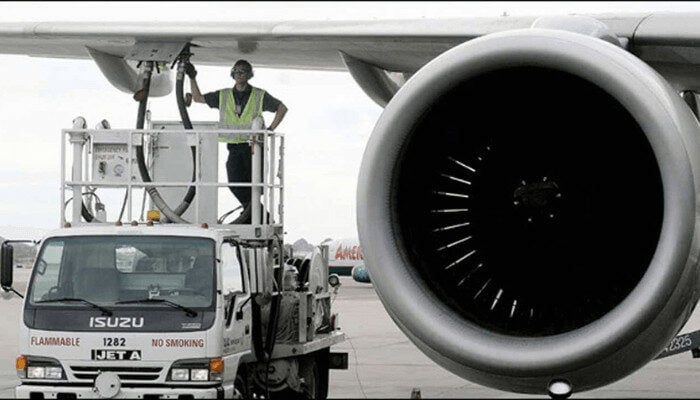The former managing director of the Federal Airports Authority of Nigeria (FAAN), Dr Richard Aisuebeogun, has warned that the aviation fuel market in Nigeria risks being monopolised as marketers continue to show reluctance to import aviation fuel, also known as Jet A1.
Speaking during the Gateway Colloquium organized by CITA in partnership with the League of Airports and Aviation Correspondents (LAAC) themed ‘Aviation Fuel Business: The Scenario and the Metaphor,’ Aisuebeogun said, the current trend could lead to a situation where a single dominant supplier controls the market.
Dr Aisuebeogun, who is also the Co-founder of Geometric Aviation Synergy Services Ltd, cautioned that such a scenario could result in price manipulation and inefficiencies in the sector.
“At present, many of the marketers you see, and many of them are here with us, are reluctant to import jet fuel due to uncertainty. The unfortunate thing is that if we allow this to continue, there is a risk that a single dominant supplier will emerge. And if that happens, it will potentially lead to price manipulation and market inefficiencies,” he said.
He further stressed the need for strong regulatory oversight to prevent monopolistic practices and ensure fair competition in the industry.
“We must fight against that. It’s like running away from one problem and running into another, and that’s not what we want. Price control may not be feasible when that happens. Our regulatory oversight in preventing monopolistic practices and encouraging fair competition remains the key driver for market stability and consumer protection,” he added.
Though, Dr Aisuebeogun said domestic refining, if done adequately, will reduce import dependency, he argued that new refinery and rehabilitation of existing ones is pivotal to successful availability of jet fuel.
“The inauguration of a new refinery and the rehabilitation of existing ones obviously is pivotal in the shift to successful production of Jet fuel. Since we are focused on jet fuel and, of course, other petroleum products, but essentially jet fuel in this case now. Now, the interesting thing is that domestic refining, if done adequately, will reduce import dependency.
“It will stabilise supply, and it will enhance quality control and of course, all of these are midwived by agencies responsible for regulation,” he stated.
Speaking earlier, the group managing director of CITA Energies, Thomas Ogungbangbe, stressed that restoring the 98-kilometer idle pipeline at the Lagos airport would significantly reduce traffic congestion by keeping over 100 JET A1 trucks off Lagos roads daily.
He said the pipeline, which had been non-functional for over three decades , would not only ease fuel supply to airlines but also eliminate surface transportation of aviation fuel, reducing costs and improving safety.”
Ogungbangbe said there was a need to have hydrants built into some of the airports so that the safety issues that come with the pipeline could be eliminated.
“Having these pipelines will save Nigeria millions of dollars. The responsible agencies should work together to look at the possibilities of restoring the abandoned pipeline. Most of the vessels that carry these products from Nigeria, go to other countries like Togo to do their repairs because we do not have the facilities. We need to secure things like these that will bring opportunities to Nigeria,” he explained.
Speaking on the product quality, he said, enhanced inspection and real-time depot throughput monitoring are necessary to regulate small facilities operating at high volumes.
“The Nigeria Civil Aviation Authority (NCAA) mandates a minimum 7-day storage buffer; major marketers comply, but many smaller depots operate below the recommended 300,000L capacity, jeopardizing supply and safety
“Many airport depots lack a good road network for bowsers. Public-private partnerships (PPP) could drive infrastructure upgrades at key airports including Lagos, Abuja, and Port Harcourt,” Ogungbangbe said.





